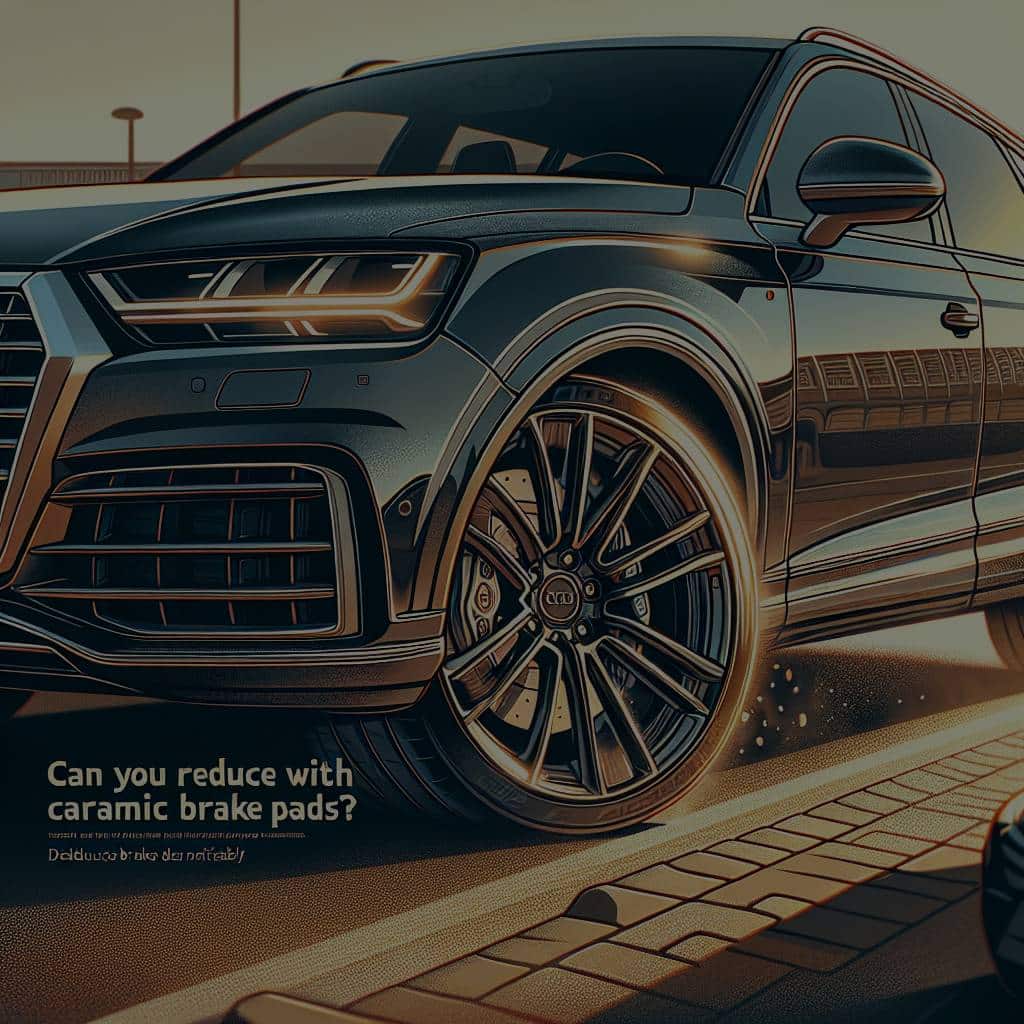Can You Reduce Brake Dust on an Audi Q7 with Ceramic Brake Pads?

As a proud owner of an Audi Q7, you are not just settling for any vehicle; you demand the best. You have a high-performance vehicle that you consistently expect to deliver an exceptional driving experience. One of the factors that contribute to this top-notch performance is your brake system. You may have noticed, however, that your current brake pads are producing a significant amount of brake dust. This can be quite unsightly, especially when it accumulates on your wheels. You might have wondered: could ceramic brake pads be the solution to reduce this dust? Let’s delve into this topic further and find out if switching to ceramic brake pads could indeed be a solution to this problem.
The Issue with Brake Dust
Brake dust is a common issue for many vehicles, not just premium ones like the Audi Q7. It’s caused by the wear and tear of brake pads, which produces tiny metallic particles. These particles stick to your wheels due to the heat generated when braking, leaving a grimy residue. It’s essential to understand this process to see how ceramic brake pads might offer a solution.
A voir aussi : How to Calibrate the Steering Angle Sensor in a BMW M3 After Alignment?
When your brakes are applied, the brake pads create friction against the brake rotors, slowing down your vehicle. The material from which these pads are made greatly affects the amount of dust generated. Most standard brake pads are made from a semi-metallic material that’s known for producing a lot of dust.
The Potential Benefits of Ceramic Brake Pads
Ceramic brake pads are considered a premium option in the auto industry. They’re made from a blend of copper fibers and ceramic material. This composition allows them to handle high brake temperatures with less heat fade, providing a more consistent performance. Moreover, they offer quieter braking due to the material’s ability to dampen noise better than semi-metallic pads.
Dans le meme genre : How to Choose the Right Motorcycle Gloves for Both Safety and Comfort?
Most importantly for our discussion, ceramic brake pads produce less dust. The dust they do produce is lighter in color and doesn’t stick to wheels the same way as the dust from traditional brake pads. This means that you’ll find less of that unsightly grime on your wheels after a drive.
The Audi Q7 and Ceramic Brake Pads: A Premium Combination
As an Audi Q7 driver, you want to ensure that your vehicle provides optimal performance, and the brake system plays a pivotal role in this. While ceramic brake pads offer numerous benefits, it’s important to consider if they’re a good fit for your specific vehicle.
Audi, as a brand, is renowned for its performance and prestige. The Audi Q7 is no exception. With its potent engines and advanced handling capabilities, you might find that ceramic brake pads can enhance this high level of performance.
What’s more, ceramic brake pads can extend the life of your brake system. They wear more slowly than traditional brake pads, meaning less frequent changes and potentially lower maintenance costs over time.
Comparing Ceramic Brake Pads to Other Options
Before making the switch, it’s worth comparing ceramic brake pads to other options on the market. For instance, the Porsche Cayenne and the Volkswagen Touareg are two SUVs that also have a reputation for performance. Members of their respective owner communities have posted about their experiences with ceramic brake pads, providing valuable insight.
While many members have reported positive experiences with ceramic brake pads, some have noted that they can be noisier than standard pads when cold. However, most members agree that the benefits outweigh the drawbacks, particularly in terms of reduced dust and enhanced longevity.
In summary, while ceramic brake pads may not completely eliminate brake dust, they will significantly reduce its occurrence. This reduction in dust, combined with the potential for longer lifespan and better performance, makes ceramic brake pads a worthy investment for your Audi Q7. However, like any automotive decision, it’s crucial to do your research and choose a solution that suits your specific needs and preferences.
A Closer Look at Ceramic Brake Pads on the Audi Q7
As a premium Audi owner, your vehicle deserves the best. Ceramic brake pads are increasingly becoming a popular choice among car enthusiasts, primarily for their advantages over traditional brake pad materials. Let’s delve deeper into the benefits and potential downsides of using ceramic brake pads on your Audi Q7.
As mentioned earlier, the most significant advantage of ceramic brake pads is their ability to produce less brake dust. This translates to cleaner wheels and less frequent car washes. Moreover, the dust that ceramic brake pads produce is lighter in color and doesn’t adhere to the wheels as much as the dust from traditional brake pads.
On top of that, ceramic brake pads are known for their durability. Unlike standard brake pads, ceramic ones don’t wear out as quickly. This means fewer replacements and, potentially, lower maintenance costs in the long run. This robust nature is particularly beneficial for high-performance cars like the Audi Q7, as it can help maximize the efficiency of the braking system.
However, there are some considerations to bear in mind. Some Audi Q7 owners noted that ceramic brake pads can be noisier when cold. This issue seems to diminish once the brakes have warmed up.
In conclusion, ceramic brake pads offer several benefits that could enhance your Audi Q7’s performance. While they do have a couple of downsides, many Audi owners believe that the benefits far outweigh these minor inconveniences. It’s always advisable to weigh all factors before making a decision.
Wrapping Up: Is it Worth Switching to Ceramic Brake Pads on Your Audi Q7?
In the end, the decision to switch to ceramic brake pads on your Audi Q7 boils down to your personal preferences and expectations of your vehicle. Therefore, it’s crucial to research and consider all options before making a decision.
Ceramic brake pads are indeed a premium option that can complement the superior performance and prestige of your Audi. They offer several advantages, including less brake dust, longer lifespan, and potentially lower maintenance costs. However, they can be slightly noisier when cold, a minor inconvenience that seems to fade once the brakes warm up.
Reviews from owners of high-performance SUVs like the Porsche Cayenne and the Volkswagen Touareg also provide valuable insights. Despite a few minor drawbacks, most owners agree that the many benefits of ceramic brake pads make them a worthy investment.
In closing, ceramic brake pads might not totally eradicate brake dust, but they can significantly reduce it. The decrease in brake dust, combined with better performance and longer lifespan, could make ceramic brake pads a sound investment for your Audi Q7. However, as with any automotive decision, it is crucial to conduct thorough research and choose an option that meets your individual needs and driving habits. Considering all the benefits and minor drawbacks, it seems that ceramic brake pads are a practical and efficient choice for the Audi Q7.
